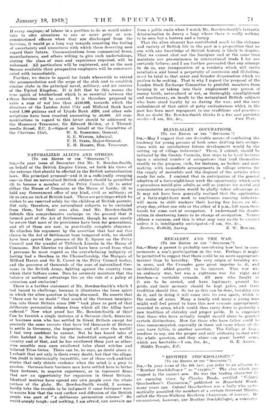NATURALIZED ALIENS AND OTHERS.
[To THE EDITOR 07 ITU " SPECTATOR."1
Sin,—In your issue of December filet Mr. E. Bowden-Smith, on behalf of the British Empire Union, set forth his views of the reforms that should be effected in the British naturalization laws. His principal proposal—and it is a sufficiently sweeping one—is that no naturalized British subject should be permitted (1) to become a member of the Privy Council; (2) to enter either the House of Commons or the Moose of Lords; (II) to hold any Government office of any kind, civil or military; or (4) to own an inch of British land. These are privilegeswhich he wishes to see reserved solely for the children of British parents. Not only, therefore, are naturalized subjects to he excluded from them, but their sons also. And Mr. Bowden-Smith defends this comprehensive embargo on the ground that it formed part of the Act of Settlement, though he must surely he awarethat most of its provisions have been for generations, and all of them are now, in practically complete abeyance He clinches hie argument by the assertion that had not this clause in the Act of Settlement been tampered with, we should have been spared the presence of Sir E. Speyer on the Privy Council and the scandal of Tribitsch Lincoln in the House of Commons. But 'likewise we should have been saved from what I presume be must regard as the overwhelming indignity of having had a C(oschen in the Chancellorship, the Marquis of Milford Haven and Sir E. Cassel in the Privy Council to-day, and the presence of thousands of the sons of naturalized Ger- mans in the British Army, fighting against the country from which their fathers came. Does he seriously maintain that the balance of national advantage lies on the side of a policy of ostracism and exclusion?
There is a further statement of Mr. Bowden-Smith's which I feel' bound to challenge, because it illustrates the loose spirit in which the alien question is being diecuseed. He asserts that "there can be no doubt" that much of the German immigra- tion into Great Britain since 1900 " took place as part of that deliberate permeation scheme from which all the Allies have suffered." Now what proof has Mr. Bowdon-Smith of this? Can he furnish a single instance of a German clerk, financier, or business man who has settled In Great Britain except for precisely the same reasons that have led thousands of Britons to settle in Germany, the Argentine, and all over the world? I feel very confident he cannot But he has heard tales of plots hatched in 'Berlin for the industrial conquest of this country and of that, and he has swallowed them just as other- wiee sensible men once swallowed tales about witches and believed Titus Oates. There can be, he eays, no doubt about it. I submit that not only is there every doubt, but that the allega- tion itself is Intrinsically incredible, one of those cock-and-bull stories that only obtain credence when the mind is a prey to Passion. German-born business men have settled here to 'better their fortunes; to acquire experience, or to represent firms that saw- an opportunity for expansion in Great Britain. Identical motives have spread our own people over the whole surface of the globe. Mr. Bowden-Smith would, I assume, hardly take the-trouble to-be indignant if some foreigner were to assure him' that-the vast outflow and diffusion of the British People was part of " a deliberate permeation scheme." He wouldusimply laugh; andnothing; I am afraid, can restrain me
from a polite smile when I watch Mr. Bowden-Smith's fantastic determination to descry a bogy where there is really nothing to be seen but a lantern and a turnip
That the alien element has contributed much to the richness and variety of British life in the inlet is a proposition that no one with' any knowledge of British history is likely to dispute. ThM we cannot shut out the foreigner and at the same time maintain our pre-eminence in international trade I for ono certainly believe; and I am further persuaded that any attempt to do so, any inauguration of a vendetta which will invite retaliation and breed a perpetuity of confusion and ill-feeling, most be fatal to that saner and broader dispensation which we profess to be seeking. That is why I regard the proposal of the London Stock Exchange Committee to prohibit members from keeping in or taking into their employment any person of enemy birth, naturalized or not, as thoroughly unenlightened and reactionary, an insult. to the naturalized British subjects who have stood loyally by as (luring the war, and the very embodiment of that spirit of petty exclusiveness which in the past has been most repugnant to our traditions and practices. But no doubt Mr. Ilowdeu-Smith thinks it a fine and patriotic


































 Previous page
Previous page